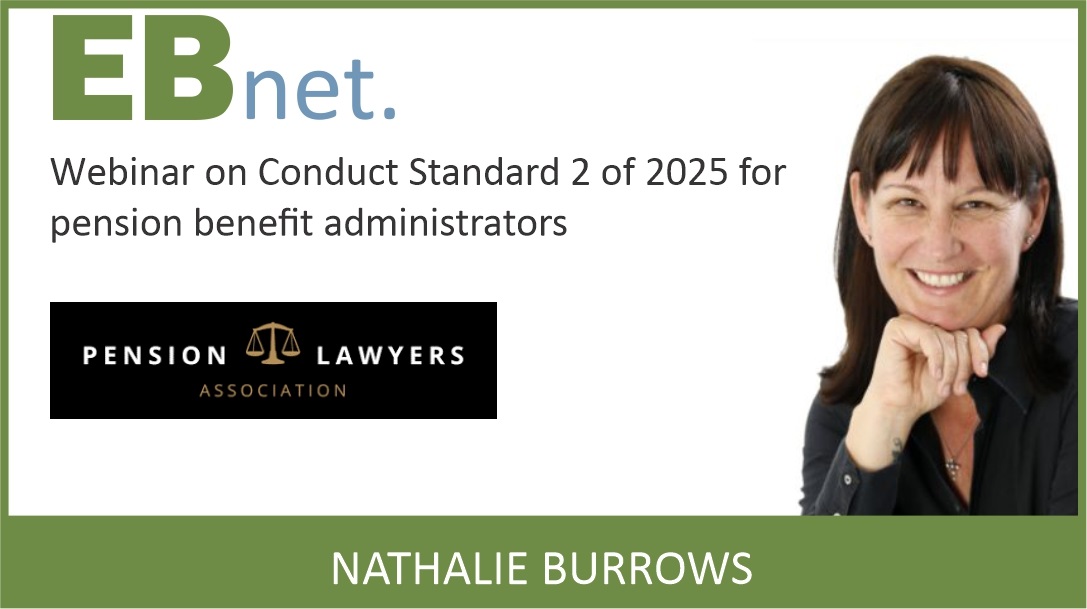Nathalie Burrows, Editor at EBnet
The Financial Sector Conduct Authority (FSCA) published Conduct Standard 2 of 2025, titled “Conditions Prescribed for Benefit Administrators,” on 6 August 2025. This standard replaces the outdated Board Notice 24 of 2002 (BN 24), modernising the regulatory framework for benefit administrators in line with other financial institutions in the financial sector. It aims to enhance governance, transparency, and fairness in administration services.
On 2 September, the Pension Lawyers Association held a webinar to unravel this new Conduct Standard, where Deirdre Phillips (Bowmans), Chantal Manson (Liberty Group) and Leanne van Wyk (Ensimini Financial Services) focused specifically on the rationale for the new standard, the fit and proper requirements for key persons, communication and disclosure obligations, the distinctions between trust and suspense accounts, and the provisions on conflicts of interest, including disclosure requirements.
Rationale for the Conduct Standard
The previously regulatory framework for administrators was Board Notice 24 of 2002 – that’s 23 years ago! The introduction of Conduct Standard 2 of 2025 modernises regulatory environment for administrators in line with the evolutions since 2002, including Treating Customers Fairly (TCF), the 2014 Retail Distribution Review, and the 2018 Twin Peaks regulation model. These reforms have shifted the regulatory focus toward customer outcomes, transparency, and robust governance – none of which were adequately addressed in BN 24 of 2002.
Outdated regulations in place for administrators also meant that outcomes, and conduct expected from them didn’t align with standards in other financial sectors supervised by the FSCA resulting in some gaps. The presenters pointed out that Conduct Standard 2 of 2025 aims to close these gaps, ensuring administrators operate with integrity, competence, and a customer-first mindset. It also harmonises requirements with broader financial sector laws, like the Financial Sector Regulation Act (FSRA) and the Pension Funds Act (PFA), promoting consistent, principles-based, and rules-based approaches.
By balancing these elements, the standard ensures that benefit administrators deliver fair outcomes to customers – defined as pension funds, their members, and beneficiaries – in a disciplined, transparent and accountable way. This update was needed to protect stakeholders and elevate industry practices to contemporary expectations.
Fit and Proper requirements for Key Persons
A key introduction in the standard is that of fit and proper requirements for designated key persons, effective from the date of publication. Key persons include the governing body (directors), chief executive officer, senior management (individuals influencing financial standing or policy enforcement), and heads of control functions related to benefit administration services. The standard requires that all such persons meet stringent criteria of honesty, integrity, good standing and competence.
Honesty and integrity are assessed through prima facie evidence, including past contraventions, convictions, or debarments. The FSCA will evaluate compliance holistically, considering the severity, relevance and recency of any misconduct.
Competence demands adequate skills, knowledge, qualifications and experience. The presenters pointed out that, different to the FAIS requirements, a list of approved qualifications will not be published by the FSCA. It is up to the governing body to look at the outcomes required of a key person’s position and ensure that the incumbent has an appropriate qualification to ensure these outcomes.
Benefit administrators must notify the FSCA within 30 days of key person appointments or terminations using prescribed forms. Non-compliance may prompt directives for training, outsourcing, suspension, or termination. The FSCA retains authority to object to appointments if they contravene the PFA, fail fit and proper tests, or conflict with public interest, thereby safeguarding the integrity of pension fund administration.
Requirements for communication and disclosure
The Conduct Standard outlines enhanced obligations for communication, disclosure, and complaints management, all of which were simplified following stakeholder consultations on the original draft published.
Administrators must disclose “all relevant facts” to funds before, during, and after concluding administration agreements – information that could reasonably influence the fund’s decisions. This applies to both umbrella and standalone funds, with silence potentially constituting misrepresentation if it materially distorts the contractual landscape. What constitutes “all relevant facts” I hear you ask? This is difficult to pinpoint and requires conversation and articulation by the governing body.
Communications to customers must be in plain language, timely, relevant, complete, factually accurate, and non-misleading or deceptive. They should promote understanding of services and account for customers’ needs and circumstances. The standard defines customers broadly to include funds, members, and beneficiaries, imposing a direct obligation on administrators to communicate with members where applicable, despite industry debates on this point. The speakers noted a missed trick here – in that, the standard omits explicit requirements for notifying employers of non-payment of contributions, highlighting a potential area for future refinement.
Distinctions between trust accounts and suspense accounts
The standard enhances financial management provisions, particularly regarding trust and suspense accounts, to ensure proper handling of fund monies. Trust accounts, though not explicitly defined, refer to interest-bearing accounts separate from the administrator’s assets, used for receiving contributions or other amounts on behalf of funds (inflows) or facilitating payments like benefits (outflows). Identified inflows must be allocated within two business days; unallocated amounts require investigation within the same timeframe, with reporting to senior management and the relevant fund if unresolved after 30 days. Quarterly reports to the governing body are mandatory, and daily reconciliations, reviewed monthly by seniors, must address items within seven business days. Rejected payments are returned to the fund within two business days.
In contrast, suspense accounts temporarily hold doubtful or unclassified payments – where the origin or classification is uncertain – until confirmed and allocated. Unclassified payments (uncertain origin) must be investigated without delay and transferred to suspense if unresolved within three days. Doubtful payments involve disputes, such as incorrect amounts.
Monthly reports to senior management and quarterly updates to the governing body, including balances and aging, are required. Unlike trust accounts, which focus on fund-specific allocations with interest accrual, suspense accounts serve as a holding mechanism for administrator-received ambiguities, emphasising swift classification over immediate fund attribution.
Administrators were cautioned to understand these differences and ensure that they open suspense accounts immediately if so required for their administrative processes.
Provisions relating to conflicts of interest and disclosure
The Conduct Standard introduces requirements for conflict of interest management, effective six months after publication. This, to support the imperative of building trust in the financial services sector. Benefit administrators are required to adopt a comprehensive conflict of interest policy, approved by their governing body. This policy must outline how to identify, avoid, or mitigate conflicts, and it needs to be reviewed annually.
If a conflict arises, for example, an administrator has a financial stake in a service provider, they must either avoid it or disclose its nature and source to the fund and members in clear terms. Material conflicts must be reported to the FSCA, ensuring oversight. This transparency is designed to protect members from decisions that prioritise profit over their interests, aligning with the standard’s broader goal of fair treatment.
The governing body is responsible for notifying the FSCA of any material conflicts that might prejudice stakeholders, aligning with PFA section 13B(10), which mandates immediate written notification of prejudicial matters.
What this means for the industry
Conduct Standard 2 of 2025 isn’t just a regulatory update, it’s a shift toward a more accountable, customer-focused pension fund administration sector. The fit and proper requirements ensure competent leadership, while robust communication and conflict-of-interest policies build trust. The standard’s emphasis on data governance indirectly supports better management of trust and suspense accounts, reducing the risk of unclaimed benefits. While some provisions took effect immediately, others are phased in over 6 to 12 months, giving administrators time to adapt.
ENDS
























































































